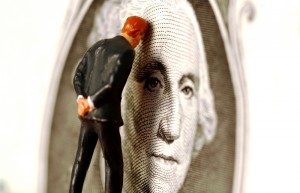Why It Matters to the Voiceless Investor and for Shareholder Activism
With the reputation of the United States on the line, Congress in the eleventh hour, passed a debt ceiling bill to avoid a first-ever government default. In exchange for more than $2 trillion in long-term spending cuts, sought by Republicans, they agreed to permit the US Treasury to borrow beyond the previous $14.3 trillion level, further elevating the so-called “debt ceiling.”
This temporary resolution avoided an economic calamity of epic proportions; save for the market’s reaction to Standard & Poor’s downgrade of the U.S. credit rating, but it also presents far-reaching challenges to shareholders and activists of publicly traded companies. As a shareholder and potential shareholder activist, one needs to be aware of several related issues that could threaten the sustainability and viability of the corporation(s) in which you invest.
For starters, what does this mean for the dollar, the global currency? According to Bill Gross, managing director at PIMCO (Pacific Investment Management Company, LLC), the US Treasury has outstanding debt of $10 trillion and the U.S. has $66 trillion in future liabilities. [King's of the Wild Frontier]
How the U.S. will pay for its future obligations is a very real concern. As part of the bill, a special task force was assigned to “search” for $1.5 trillion in spending cuts to put to vote by December 23, 2011. Will this task force have enough time to avoid a further downgrade, and keep prices and interest rates from rising in the near term? Time will tell, but investors and consumers will likely see a rise, albeit slight, in credit card and mortgage rates, especially when one considers the recent S&P downgrade of Fannie Mae and Freddie Mac, from AAA to AA+, on August 8, 2011.
The downgrade of Fannie and Freddie’s debt translates into potential greater spreads between Treasury yields (T-bonds, despite the U.S. downgrade continue to act as a safe-haven for investors) for most investors and those in mortgage-backed securities. Investors that buy mortgage bonds more often buy them because they are guaranteed by Fannie and Freddie. The yield they are getting is only as good as the guarantee. With Fannie and Freddie downgraded, those investors may command a higher premium for holding that debt, and that would translate into higher mortgage rates.
The confidence level in the world’s largest economy has been damaged. With an administration and Congress “playing chicken” (also known as the hawk-dove or snowdrift game) with something that should never have been an issue, continued downward pressure on the U.S. dollar is expected.
Put simply: “the more we owe, the less the dollar is worth.” Anything that makes it more expensive for banks to borrow makes it more expensive for the rest of us across the board.
Countries with more sound fiscal conditions are more attractive in the medium term, perhaps even longer, such as Asia and Australia. These markets are experiencing interest rates on the rise. Other countries of interest, or those dealing with “a somewhat cleaner mess” such as Brazil, Germany, Canada, and Mexico, should also be considered.
For every dollar the government spends they are borrowing .40 cents. Had the debt ceiling not been increased the government would have had to balance the budget and spend only the funds they collect. What a novel idea.
The true value of the dollar impacts the inherent value of the companies we own. If the value of the dollar is weak then the equity value of our holdings diminishes proportionally at home. The dollar requires reasonable strength to power our investments.
Financial Armageddon sits at bay while the dollar continues to weaken and buy us less. If this is the first of multiple raises in the debt ceiling combined with continued political instability in Washington with no improvement in the strength of the dollar, and balance sheet, or fiscal position then we may learn firsthand what stagflation and hyperinflation mean. At that perilous juncture we’d wish a double dip recession was the worst thing to happen.
To contact Jonathan Bayer directly, please email Jonathan.Bayer@TheShareholderActivist.com.


















